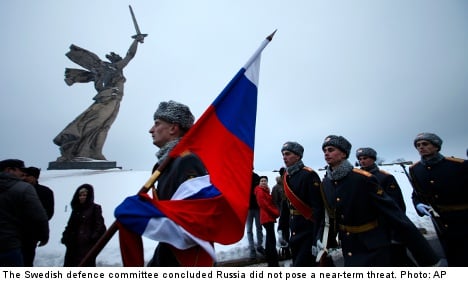“The political developments in Russia are worrying, as are the ambitious modernization plans for its armed forces. This increases insecurity compared to 2007,” Moderate MP Cecilia Widegren, chairwoman of the defence policy advisory committee, said in a statement.
The report by the committee, which includes representatives from the government and the political parties represented in the Riksdag, concluded there was no threat of an attack in the near future, a conclusion also reached in the committee’s 2007 report. Yet the parliamentarians agreed that political developments in Russia were a potential concern and that Russia’ pull towards authoritarianism could bring about potential instability.
The advisory committee went on to propose that Sweden extend its cooperation with Nato.
“The defence advisory committee’s view is that cooperation with Nato should continue to be developed within the framework of Swedish partnership,” the report stated.
The advisory committee brings together representatives of all the political parties, whether they be in power or in opposition, and provides a forum to discuss defence policy across party lines. Its new report was handed to the government late on Thursday and has now been made public.
As well as entrenching Nato cooperation, the report called for greater cooperation across the Nordic countries, with “great possibilities” for greater coordination, and encouraged looking at the possibility of having Sweden reach out to its Baltic neighbours Lithuania, Estonia and Latvia.
“Developments today take place at an ever more rapid pace, they are ever more complex and they are less easy to predict,” Widegren said on Friday, referencing not only military threats but climate change and natural disasters.
It also noted that Sweden prioritized its work within the EU.
“Our security is increased through European integration and expansion,” the report noted, adding that Sweden must consider that any attack would target more countries in the region than solely Sweden.
There were disagreements in the advisory committee, however, on how to describe Russia’s militarization and the threats it may pose. While opposition parties the Social Democrats and the Sweden Democrats wanted to underscore the potential threat, as did the government coalition parties the Christian Democrats and the Liberals (Folkpartiet), they were tempered by their colleagues.
The Moderates, the Left Party, the Greens, and the Centre Party all wanted a more moderate use of words to describe any would-be Russian threat. They cited the fact that militarization was taking place from a low starting point and that it remained unclear whether the Russian economy could afford to support an aggressive upgrade.
They also noted that Europe was an important export market for Russian energy companies and that there was no financial incentive for Moscow to antagonize relations with its western neighbours.
TT/The Local/at


 Please whitelist us to continue reading.
Please whitelist us to continue reading.
Member comments